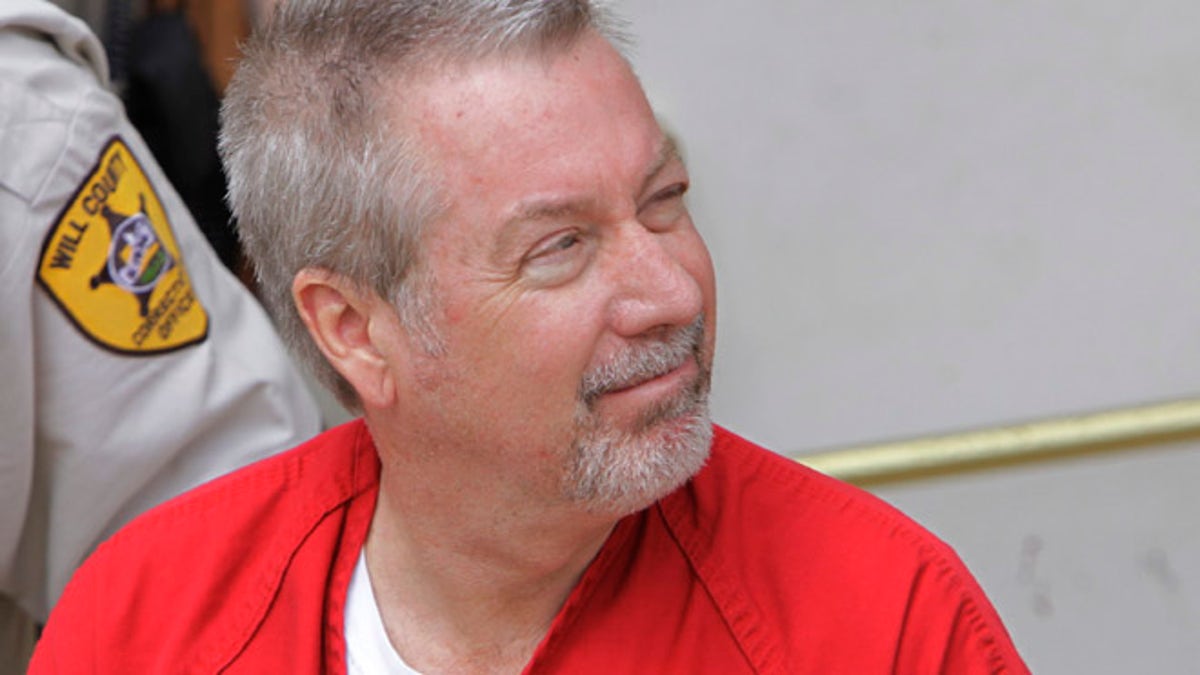
Drew Peterson leaves the Will County Courthouse in Joliet, Ill., after his arraignment in 2009 on charges of first-degree murder in the 2004 death of his third wife Kathleen Savio. (AP)
JOLIET, Ill. – The judge at Drew Peterson's murder trial on Tuesday lambasted prosecutors who for the third time in as many weeks broached a subject they were told not to mention in front of jurors -- again raising the possibility that the case could end with the judge letting the former police offer go free.
Judge Edward Burmila seemed unmoved by repeated apologies by an attorney for the state and said he would rule Wednesday on whether to declare a mistrial in a case beset by problems from its outset.
Peterson, a 58-year-old former police officer in the Chicago suburb of Bolingbrook, has pleaded not guilty to first-degree murder in the 2004 death of his third wife, Kathleen Savio.
Just two hours before, Burmila had told prosecutor Kathleen Patton not to ask a witness about whether Savio had sought an order of protection against Peterson in front of the jury. When she did, he told jurors to leave the room and berated the prosecutor.
"There was one thing I told you not to go into and that's exactly what you did," Burmila told her.
Investigators collected no physical evidence after Savio was found dead in a dry bathtub at her home, and authorities initially ruled that Savio accidentally drowned. But after Peterson's fourth wife, Stacy Peterson, disappeared in 2007, Savio's body was re-examined and her death was reclassified as a homicide.
Patton explained that the question was on a prepared list of questions and that she read it inadvertently.
"I'm sorry," Patton said. "It's my fault. I can't believe I did it."
During a break, Patton sat in an adjoining courtroom, her shoulders slumped forward, her face buried in her hands, shaking her head over and over. Her boss, Will County State's Attorney James Glasgow, stood a few feet away, his head down.
The error came just as the trial seemed to be going prosecutors' way in recent days, with the judge granting them permission to present hearsay evidence central to their case.
Hearsay, or statements not based on the direct knowledge of a witness, is not usually admissible in court, but Illinois passed a law in the wake of the Peterson case that allows it in certain circumstances. Prosecutors have acknowledged they have no physical evidence linking Peterson to Savio's death, so hearsay evidence about what Savio allegedly said to other people is crucial to their case.
The mistake also came as Patton was questioning one of the state's most compelling witnesses so far.
Former police officer Teresa Kernc had just told jurors about interviewing Savio in 2002 after Peterson allegedly broke into Savio's home in a SWAT uniform and repeatedly pushed her to the ground.
At one point, Savio allegedly told Peterson, "Go ahead and do what you came to do: Kill me," Kernc testified.
"He said, `Where do you want it?' And she said, `In the head."' Kernc testified.
Peterson then allegedly told Savio to turn her head, which Savio did, Kernc said, based on what Savio told her.
"And then he said, `I can't kill you,"' she told jurors. Peterson then threw a garage opener to the ground and left.
Shortly after Kernc finished telling that story, Patton turned and asked, "Did she tell you she wanted to get an order of protection?"
The defense objected to Patton's question, and the judge asked jurors to leave the room.
Savio hadn't asked for such an order at that point and the judge would have regarded the subject as creating a bias against Peterson, a Chicago defense attorney not connected with the case explained.
"It can affect a jury unfairly because it's a signal that he is a bad, violent person," attorney Gal Pissetzky explained,
Defense attorneys asked not only for a mistrial but for a "mistrial with prejudice," meaning Peterson could be set free and never be charged again with Savio's murder. Declaring a mistrial with prejudice is a rare judicial step. Burmila could also declare a more standard mistrial, meaning Peterson would be retried later.
The judge could also instruct the jury to disregard what the prosecutor said. If he takes that route, it could still signal to jurors that prosecutors have -- again -- messed up, potentially influencing their decision during deliberations.
Defense attorney Joel Brodsky cited other times prosecutors broached prohibited subjects, including when Glasgow -- just 10 minutes into his opening statement -- referred to an accusation that Peterson once tried to hire a hit man.
"It is an avalanche of prejudicial, illegal evidence that is polluting this jury," he said. "To have this many ... errors, how can the defendant get a fair trial?"
Peterson is a suspect in the disappearance of his fourth wife, who is presumed dead but whose body has never been found. He has never been charged in that case.
Defense attorneys not connected to the Peterson case expressed disbelief that prosecutors have made so many mistakes.
"It's, at minimum, sloppy," said Sam Adam, Jr., who represented imprisoned former Illinois Gov. Rod Blagojevich at his first corruption trial.

